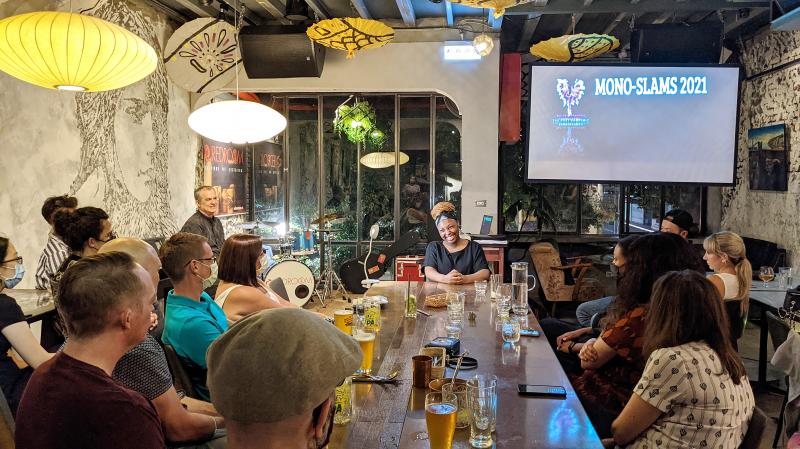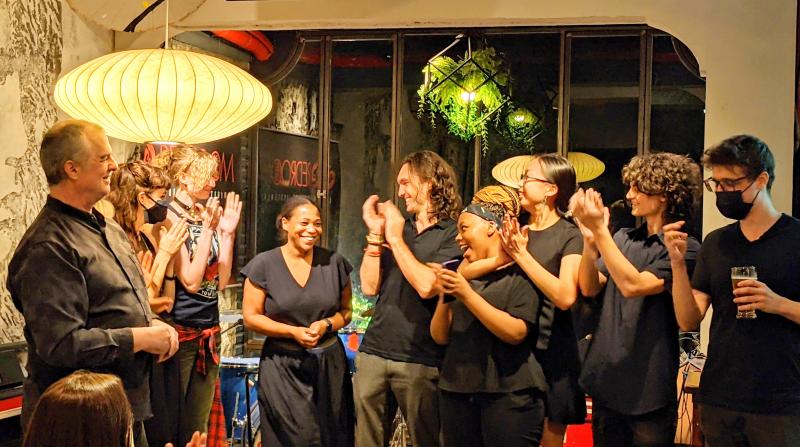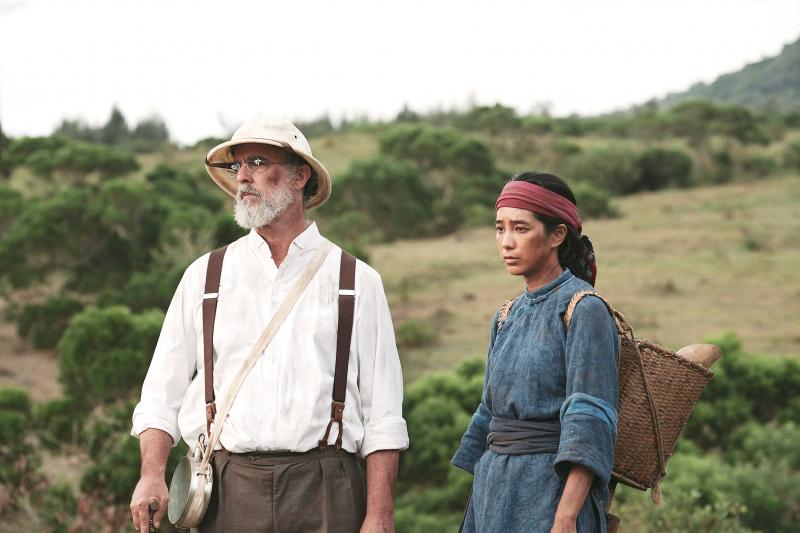The pandemic seems to be far from over, but the Post Pandemic Renaissance Theater (PPRT) is getting a head start by putting on its first event last Friday: the first round of the Taiwan Monologue Slam.
Ten contestants delivered passionate and nuanced pieces on stage, and the audience voted with their phones for two winners who will advance to the local finals in November. There will be four finals in the next year, and each winner is automatically entered into the World Monologue Games regional finals, bypassing the preliminaries.
The goal is to eventually get a Taiwan team to next summer’s games, while also encouraging locals who want to practice English to engage in experiential learning, company founder and artistic director Stewart Glen says.

Photo: Han Cheung, Taipei Times
Don’t be intimidated by the talent on stage last week as the slammers at the first event were all English-speaking members of the PPRT company, and first place winner Cleo Whittingham is a seasoned, classically-trained actress. Glen hopes to attract a wider range of participants over the next two months with a lofty goal of having the final team being 80 percent Taiwanese. This is in line with the government’s vision of developing Taiwan into a bilingual nation, he says.
“If the Taiwanese slammers show interest and promise, they will be invited to train with us to build their English confidence skills,” Glen says. “You don’t have to be an actor to be a slammer. This is less for people that want to be actors and more for frustrated ESL students.”
The company is keeping busy in the next two months, with monologue slams every other Friday at the Red Room Rendezvous, and live staged readings of acclaimed as well as original screenplays on alternate Fridays at 23 Comedy Club. Both event formats will not have sets, props and costumes so that the focus is purely on the raw and honest acting skills, Glen says.

Photo: Han Cheung, Taipei Times
This Friday’s reading will be of After Miss Julie by Patrick Marber, and on Oct 1 they will debut their first original: Thomas Kyd’s The Scottish Lady by former Taipei resident Jamie Lewis Huss, a reimagining of Shakespeare’s MacBeth that sees “Lady M” attempting to rid Scotland of toxic masculinity.
Glen, who has three decades of acting and coaching experience, says it was Huss’s cheeky “full five-act plays in iambic pentameter” that led him to originally start the company about a year ago.
“He has a big hate-on for Shakespeare, so he writes as if Shakespeare has stolen the plays,” Glen says. “He always put an Elizbethan writer’s name before the title as if it’s an unearthed script.”

Photo courtesy of Howard Yu
The only one that Huss actually attributes to Shakespeare is Robin Hood, which the real-life Shakespeare did not write and it portrays the titular hero and William the Conqueror in a same-sex love affair.
Impressed, Glen set out to bring these plays to full production. The Friday readings are just the start, and despite the lack of frills, they are directed and thoroughly rehearsed.
The monologue slams, on the other hand, is part of Glen’s mission to change the way locals learn English. Instead of buxibans (cram schools), he champions the idea of a lianxiban (練習班, practice class) where people hone their skills through experiential learning, especially acting. One workshop Glen offers is the Actor Workout. He meets the student on Zoom and sends them a monologue, upon which the student does a cold reading. They discuss it, and the student gets 10 minutes to rehearse and do a second take, and by the third, the results are usually quite amazing, he says.
It doesn’t matter if they can’t fully grasp the cultural nuances of the plays; the point is exposure and practice.
“They don’t accept here that language is an art,” Glen says. “How do you get better at art? Practice, practice, practice, but they still think it’s study, memorize, test. In experiential learning, it’s a pass / fail system with a quantitative assessment, you put in the work and you pass.”
Tickets for the slams are NT$300, including one drink; stage readings are NT$400
Those interested can audition now. For more information, visit www.facebook.com/postpandemicrenaissance

Three big changes have transformed the landscape of Taiwan’s local patronage factions: Increasing Democratic Progressive Party (DPP) involvement, rising new factions and the Chinese Nationalist Party’s (KMT) significantly weakened control. GREEN FACTIONS It is said that “south of the Zhuoshui River (濁水溪), there is no blue-green divide,” meaning that from Yunlin County south there is no difference between KMT and DPP politicians. This is not always true, but there is more than a grain of truth to it. Traditionally, DPP factions are viewed as national entities, with their primary function to secure plum positions in the party and government. This is not unusual

More than 75 years after the publication of Nineteen Eighty-Four, the Orwellian phrase “Big Brother is watching you” has become so familiar to most of the Taiwanese public that even those who haven’t read the novel recognize it. That phrase has now been given a new look by amateur translator Tsiu Ing-sing (周盈成), who recently completed the first full Taiwanese translation of George Orwell’s dystopian classic. Tsiu — who completed the nearly 160,000-word project in his spare time over four years — said his goal was to “prove it possible” that foreign literature could be rendered in Taiwanese. The translation is part of

Mongolian influencer Anudari Daarya looks effortlessly glamorous and carefree in her social media posts — but the classically trained pianist’s road to acceptance as a transgender artist has been anything but easy. She is one of a growing number of Mongolian LGBTQ youth challenging stereotypes and fighting for acceptance through media representation in the socially conservative country. LGBTQ Mongolians often hide their identities from their employers and colleagues for fear of discrimination, with a survey by the non-profit LGBT Centre Mongolia showing that only 20 percent of people felt comfortable coming out at work. Daarya, 25, said she has faced discrimination since she

The other day, a friend decided to playfully name our individual roles within the group: planner, emotional support, and so on. I was the fault-finder — or, as she put it, “the grumpy teenager” — who points out problems, but doesn’t suggest alternatives. She was only kidding around, but she struck at an insecurity I have: that I’m unacceptably, intolerably negative. My first instinct is to stress-test ideas for potential flaws. This critical tendency serves me well professionally, and feels true to who I am. If I don’t enjoy a film, for example, I don’t swallow my opinion. But I sometimes worry